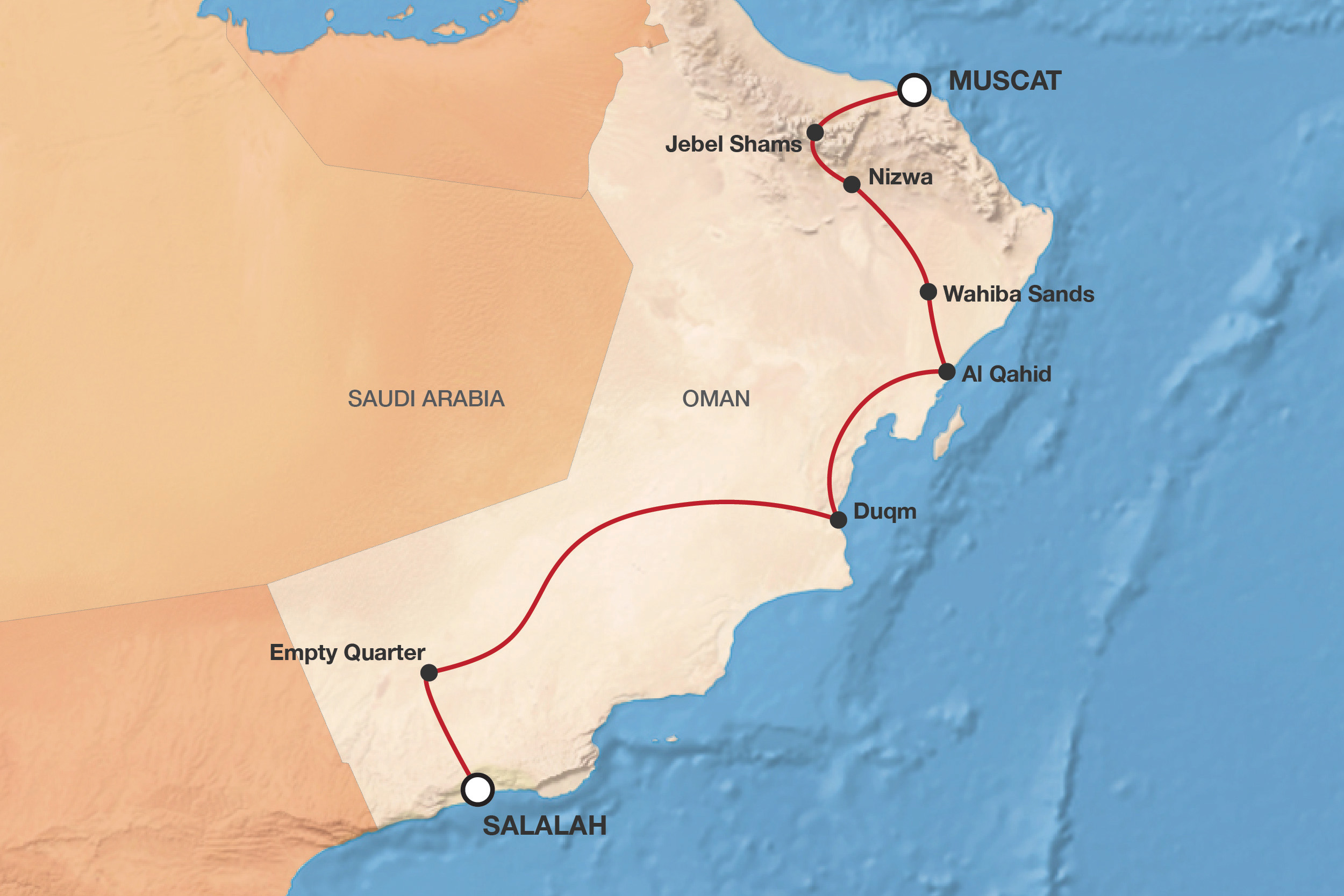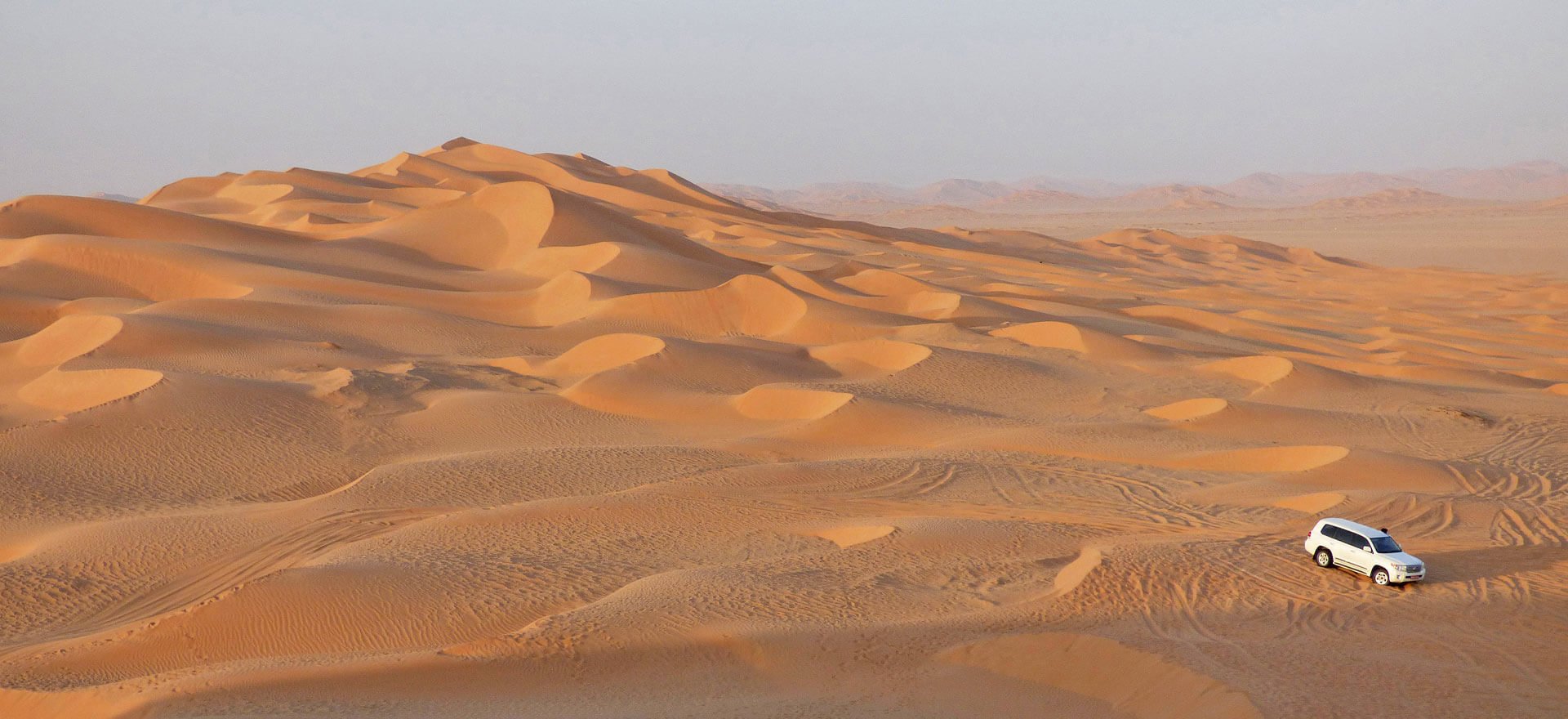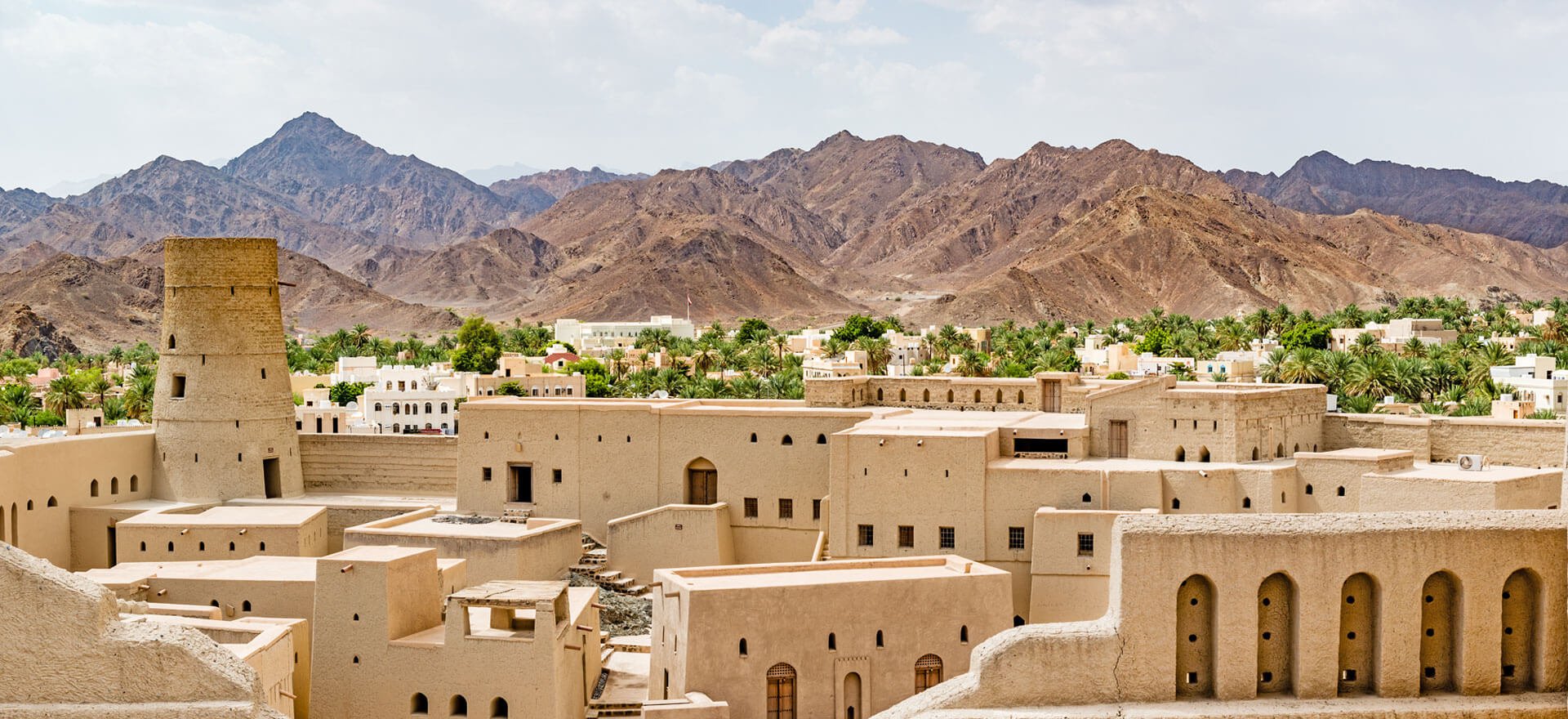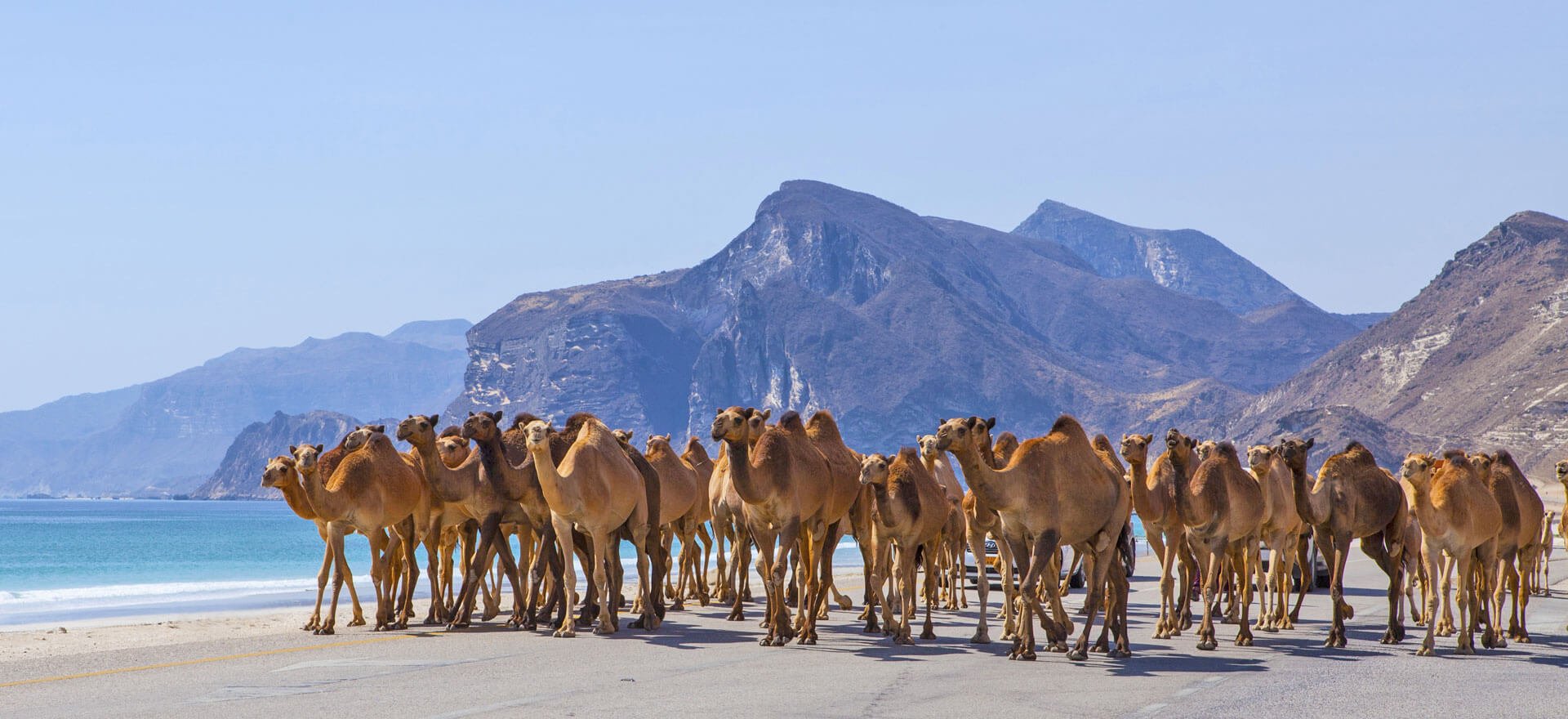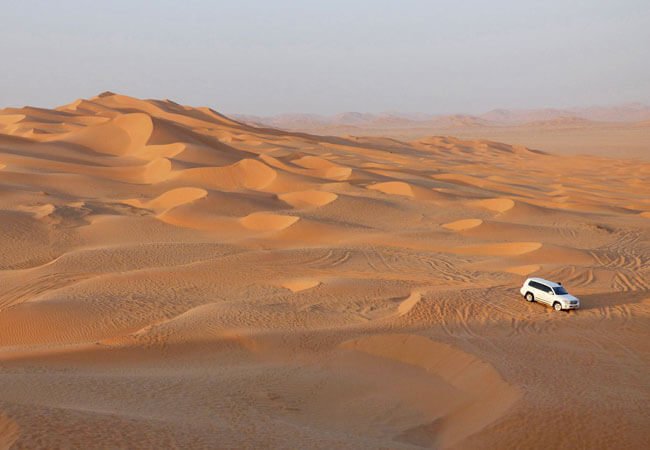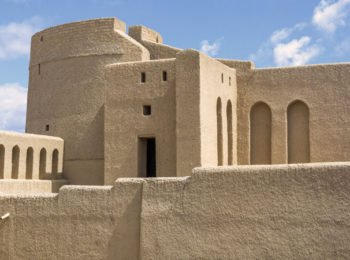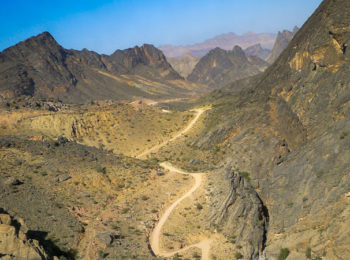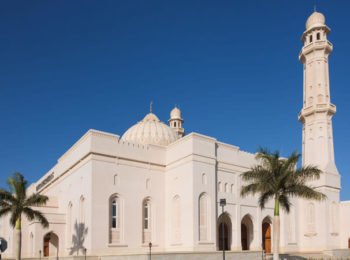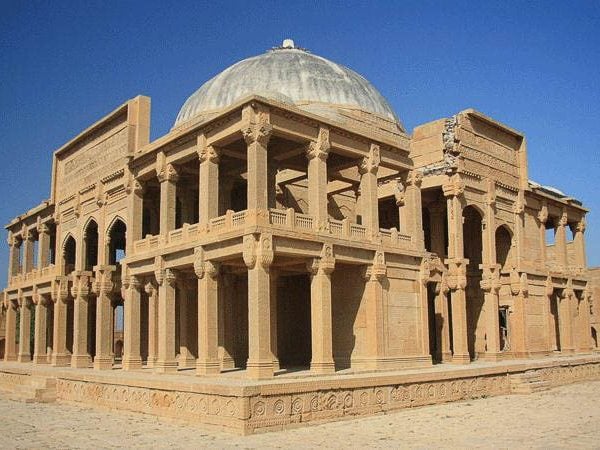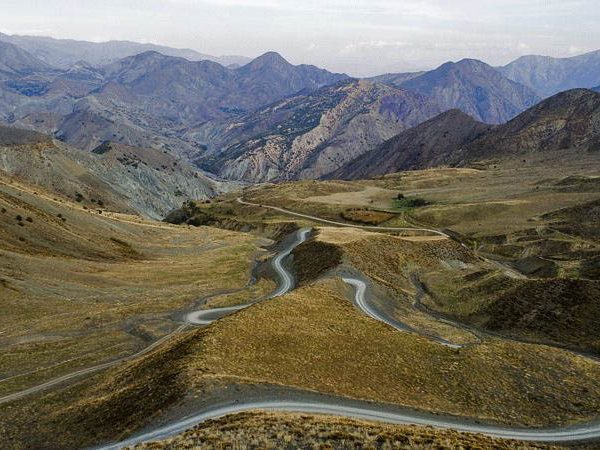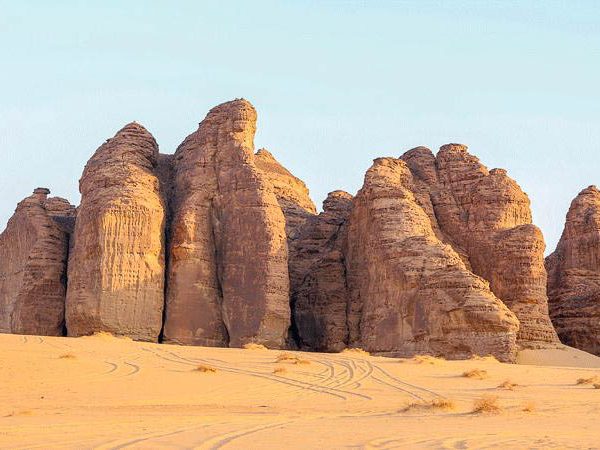Day 2 - Muscat
This morning we head out onto the Gulf of Oman to see the local dolphins – in this area they are usually very active and can sometimes be seen in groups of up to five hundred. After lunch on a small island we return to the mainland and explore Muscat, visiting its key sites such as the historic quarter and the Bait Zubair Museum with its exhibits on Omani history and heritage. Overnight Royal Tulip Hotel or similar. (BL)
Day 3 - Wadi Bani Awf – Jebel Shams
Visit the Grand Mosque in Muscat, before heading into some of Oman’s most stunning countryside as we drive into Wadi Bani Awf. The wadi leads into ‘snake canyon’ with its waterfalls and rocky pools, and then we cross the Hajjar Mountains, stopping in small traditional villages along the way. At the end of the day we enter the Jebel Shams range, where we spend the night. Overnight Jebel Shams Resort or similar. (B)
Day 4 - Jebel Shams
Spend the day exploring Jebel Shams, the ‘Grand Canyon of Oman’. We take an easy hike from the village of Al Khitaym through the rim of Al Nakhur Canyon, with great views of the villages at the bottom, and end up at the abandoned village of Al Sab before returning to the hotel. On the way we take lunch in a local family home, for an insight into Omani traditions. Overnight Jebel Shams Resort or similar. (BL)
Day 5 - Nizwa
Drive to the village of Al Hamra, with traditional mud brick houses dating back 400 years. Take lunch in a local home, before continuing to the historic town of Nizwa, Oman’s cultural capital with one of the country’s most impressive forts. Explore its souqs and the fort before heading to Jabrin Castle, dating to the 17th century. Overnight Falaj Daris Hotel or similar. (BL)
Day 6 - Sinaw – Al Munisifeh – Wahiba Sands
Vsiit the lively souk at Sinaw, and then continue to the abandoned village of Munisifieh, with its ruined mud brick mansions. From here drive to the Wahiba Sands, a mass of undulating dunes, with fantastic opportunities for off road driving. We stay tonight in a wild camp in the middle of the dunes. (BLD)
Day 7 - Desert Crossing
Accompanied by a Bedouin guide, we cross the desert to the coast, and end up at the beautiful beach of Al Qahid. We camp tonight on the shores of the Indian Ocean. Overnight camping. (BLD)
Days 8 - Duqm
Drive along a stunning coastline to Duqm, visiting the ‘rock garden’, an area of unusual and very photogenic rock structures and the white sand dunes of Khaluf. Overnight Crowne Plaza Hotel or similar. (B)
Days 9-10 - The Empty Quarter
We spend two days travelling through the renowned ‘empty quarter’, a vast and sparsely populated region of Arabia’s southern deserts. We head first towards the Qara Mountains with their views of the Salalah plains, then cross the gravel desert of El Nejd before reaching the ‘lost city’ of Ubar. Though what’s left is quite small, it is thought that this was the southern end of the ‘Frankincense Trail’ which led northwards through the region. Continue on through the desert, exploring on foot and by vehicle, en route to Salalah. Overnight camping. (BLD)
Day 11 - Salalah
Drive to Salalah, visiting Wadi Dawka on the way – home to the largest collection of frankincense trees in the region. After a welcome shower and chance to freshen up, in the evening head out to the local souk to explore. Overnight Bilad Bont Hotel or similar. (B)
Day 12 - Salalah
Spend the day exploring Salalah and the surrounding area. We visit the old fishing village of Taqah, as well as its fort, then continue to the ruins of the city of Sumahram, once an important centre of the frankincense trade. On the way back we visit the lush Wadi Darbat as well as the Al Balid archaeological site, housing the remains of the ancient city of Zufar. Overnight Bilad Bont Hotel or similar. (BL)
Day 13 - Salalah
Transfer to the airport for departure. (B)
Optional Pre or Post Tour Bahrain Extension
Day 1 - Bahrain
Arrive in Bahrain and transfer to your hotel. The rest of the day is free. Overnight Golden Tulip Hotel or similar.
Day 2 - Bahrain
Spend today exploring the island of Bahrain. We head south to see the vast site of A’Ali, home to numerous burial mounds dating back 4000 years, then take a closer look at the burial chambers of Saar. We also stop at the fort at Riffa and the remains of the temple of Barbar, before returning to the capital Manama and exploring its lively souq, and the impressive Bahrain Fort, overlooking the ocean. Overnight Golden Tulip Hotel or similar. (B)
Day 3 - Bahrain
This morning visit the National Museum to give a bit more of an insight into the history and traditions of the island. We then drive to the island of Muharraq, home to a beautifully restored historic quarter which gives an idea of what much of the country would have looked like before the discovery of oil. After a visit to a nearby shipyard which builds traditional dhows, the afternoon is free to relax or explore. Overnight Golden Tulip Hotel or similar. (B)
Day 4 - Bahrain
Transfer to the airport for departure. (B)
Please note: this extension can be modified to fit your flights – for example if you are flying into Bahrain early in the morning of Day 1, excursions can start on that day rather than waiting until Day 2. Similarly, you could fly out in the afternoon / evening of Day 3 rather than have a third night in Bahrain.
Optional Pre or Post Tour Qatar Extension
Day 2 - Doha
After breakfast we explore the city. The contrast between history and modernity, old and new is very apparent in this fast growing metropolis. We visit the National Museum of Qatar, as well as Doha’s historical quarter at the Souq Waqif Heritage Market with its extensive wares including an array of spices and herbs, textiles and art. We then head to Doha’s modern landmarks, from the Corniche at the waterfront to the West Bay District with its towering skyscrapers including Doha Tower and the government buildings, as well as the cultural village of Katara with its mosques, amphitheatre and sculptures. Overnight Best Western Hotel or similar. (B)
Day 3 - Desert Safari
After breakfast we head south, venturing into the desert to drive through the dunes to the inland sea of Khor al Adaid, close to the border with Saudi Arabia. Return to Doha and the afternoon is free. Overnight Best Western Hotel or similar. (B)
Day 4 - Doha
Transfer to the airport for your onward flight. (B)
Optional Pre or Post Tour Musandam Extension
Day 1 - Khasab - Wadi Tawi
Arrive in Khasab and transfer to the hotel. In the afternoon we head out to explore the capital and get an introduction to the Musandam Peninsula. We visit Khasab Fort, built in the 17th century by the Portuguese and housing the best ethnographic museum in Oman. From here we drive to Wadi Tawi with its prehistoric rock paintings. Overnight Atana Hotel or Similar. (D)
Day 2 - Jebel Harim
After breakfast we drive via 4wd vehicle along winding and mountainous roads. The drive can be breath-taking at times, offering some of Oman’s most stunning scenery as we pass terraced mountain villages, lush Acacia forests and wadis. Along the way we stop at Saya, one of the most picturesque villages on the Peninsula. We continue to Jebel Harim (translated as the Mountain of Women) where we can enjoy panoramic views from the mountain’s summit. From here we drive to Rowdah village, a mountain settlement with a pre-Islamic graveyard. Our drive back takes us a different route and we can enjoy ocean views at Khawr Najid and Al Khalidya Nature Reserve before heading back to Khasab. Overnight Atana Hotel or Similar. (BL)
Day 3 - Dhow Cruise
Today we enjoy a full day aboard a traditional Omani dhow. We head to Musandam’s most spectacular fjords – often dubbed the Norway of Arabia with its calm turquoise waters and limestone cliffs. We pass through small fishing villages and may encounter dolphins. There are two anchored stops during the day for lunch and to swim. Overnight Atana Hotel or similar. (BL)
Please note: dhows are very basic although they do have shaded areas.
Day 4 - Dubai
After breakfast transfer to Dubai airport. (B)
Please note that flights to Khasab are not included in the cost, but can be arranged if you need us to.
What's included?
What's not included?
Visas
Most nationalities will require a visa in advance for visiting Oman which can be obtained as an e-visa. Visa regulations can change however and so we recommend that you contact your nearest embassy for the most up to date information.
You should ensure that your passport has at least six months’ validity after the end date of your trip. We also strongly recommend that your passport has a minimum of two blank pages next to each other – on rare occasion it may lead to problems with visas and immigration authorities if it does not.
Health and vaccinations
We are not medically qualified and so we recommend that you speak to your doctor or nearest health professional for advice concerning recommended vaccinations. For more advice on vaccinations you can also visit https://travelhealthpro.org.uk/countries.
If you have any physical limitations that might impact your ability to participate in the planned tour activities, it’s essential that you make us aware as soon as possible so that we can discuss this with you.
Insurance
It is a condition of joining our tours that you have suitable travel insurance in place, and we cannot accept travellers without insurance. All policies differ in terms of what they will cover, but as a minimum you need medical and health cover, which will cover you for the whole time that you are away. Most policies will also include cancellation cover, which will cover you if an unforeseen circumstance obliges you to cancel your trip. We recommend that you obtain your insurance as soon as you book your trip.
Please note that government travel warnings often affect the validity of your travel insurance, and you should check this with your insurance company.
Money
The local currency here is the rial, and US dollars, Euros and UK pounds are all accepted for exchange purposes. Your guide will be able to help you change money.
Local conditions
When travelling to some of the destinations we offer you need to bear in mind that things won’t always work here as we’re used to them working at home. Travelling in underdeveloped and untouristed destinations requires both patience and a sense of humour. There may be problems with infrastructure, attitudes may be different, and maintenance may not be as high a standard as we would always like, but this is very much part and parcel of travelling in such a place. We aim to resolve any issues as quickly as possible, and thank you for your patience.
This is particularly relevant to this trip – Oman has a very different culture to our own, most visibly concerning the status of women in society. Please respect the advice of your guide at all times in order to avoid problems during the tour.
Many sites close between noon and 3pm, and you’ll also find that long lunches are fairly customary here, which uses this time reasonably effectively – adapting to this slower pace is necessary when you’re here.
Travel advice
We keep a very close eye on the travel advice issued by the UK Foreign and Commonwealth Office so that we can keep you up to date with any warnings. At the time of writing the FCO does not advise against travel to any parts of Oman.
This relates to advice from the British government – other nationalities need to check the stance of their own governments.
Please note that the information contained above is highly susceptible to change, and while we endeavour to keep up to date we recommend that you use this as a guide only. Should you have any questions, please don’t hesitate to contact us.
